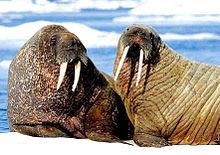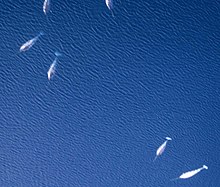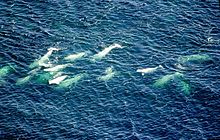List of mammals of Nunavut
Nunavut has several species of mammals (ᐱᓱᒃᑎ, pisukti),[1] of which the Inuit found use for almost all. The larger animals such as the caribou would be eaten, with the skin used for tents and clothing and the sinew used for thread. In lean times even animals such as the fox would have been eaten and some people did eat it even when other foods were available. With the arrival of the traders the fox skin became a valuable source for trade, however, traditionally the skin was not often used except as a sanitary napkin. The skins of smaller animals such as the weasel would have been used to provide decoration on clothing.
Some of the animals in this list, such as the lynx, are rarely seen as they live mainly in the very southern part of the territory away from any communities.
There are several different dialects of Inuktitut and Inuinnaqtun as well as two alphabets, Inuktitut syllabics and Latin. The Inuit name or spelling may differ from one region to another and in extreme cases from one community to another.
Artiodactyla (ᑯᑭᑯᖅᑐᔪᑦ, kukikuqtujut)
[edit]
- Bovidae (ᓇᒃᔪᒋᒃᑐᑦ)[2]
- Cervidae (ᓇᒃᔪᓖᑦ)[2]
- Caribou (ᑐᒃᑐ, tuktut) Rangifer tarandus VU
- Barren-ground caribou (ᓇᐹᕐᑐᕐᑲᓐᖏᑦᑐᒥ ᑐᒃᑐ, tuktut, tuktu) Rangifer tarandus groenlandicus[2][1] DD
- Peary caribou (ᕐᑯᑦᓯᑦᑐᒥ ᑐᒃᑐ, tuku, qakuqtakuluit tuktut, qikiqtani tuktuit) Rangifer tarandus pearyi[2][1] EN
- Moose Alces alces LC
- Western moose (ᑐᒃᑐᕙᒃ, tuktuvak) Alces alces andersoni[2][1] DD
- Caribou (ᑐᒃᑐ, tuktut) Rangifer tarandus VU

- Canidae (ᕐᑭᒻᐅᔭᑦ)[2]
- Grey wolf (ᐊᒪᕈᖅ, amaruq) Canis lupus LC
- Arctic wolf, Canis lupus arctos[2][1] DD
- Arctic fox (ᑎᕆᒐᓐᓂᐊᖅ, tiriganniak, tiriqaniaq) Vulpes lagopus[2][1] LC
- Red fox (ᑲᔪᖅ, kajuqtuq, kajuit) Vulpes vulpes[2][1] LC
- Grey wolf (ᐊᒪᕈᖅ, amaruq) Canis lupus LC
- Felidae (ᑯᑭᓕᒑᕐᔪᐃᑦ)[2]
- Canada lynx (ᐱᖅᑐᖅᓯᕋᖅ, piqtuqsiraq) Lynx canadensis[2][1] LC
- Ursidae (ᓄᑭᓖᑦ)[2]

Polar bear - Black bear (ᐊᒃᖤᒃ, aklaq) Ursus americanus[2][1] LC
- Grizzly bear (ᓇᐹᖅᑐᖃᖕᒋᑦᑐᒥ ᐊᒃᖤᒃ, atiqpuq) Ursus arctos horribilis[2][1] LC
- Polar bear (ᓇᓄᖅ, nanuq) Ursus maritimus[2][3][1] VU
- Mustelidae (ᑎᕆᐊᓂᙶᖅᑐᑦ)[2]
- Wolverine (ᖃᕝᕕᒃ, qalvik, qavvik) Gulo gulo[2][1] LC
- River otter (ᑯᒻᒥ ᐸᒥᐅᖅᑑᖅ, pamiuqtuuq) Lontra canadensis[2][1] LC
- Beringian ermine (ᑎᕆᐊᖅ, tiriaqpak, tiqiak) Mustela erminea[2][1] LC
- American ermine (ᑎᕆᐊᖅ, tiriaqpak, tiqiak) Mustela richardsonii[2][1][4] LC
- Least weasel (ᒥᑭᓂᖅᓴᖅ ᑎᕆᐊᖅ, tiriaq, tiqiak) Mustela nivalis[2][1] LC
- American marten (ᖃᑉᕕᐊᕐᓯᐊᖅ, qapviarsiaq) Martes americana[2][1] LC
- American mink (ᑎᕆᐊᖅᐸᒃ, tiriaqpak) Neogale vison[2][1] LC
- Fisher (ᑎᕆᐊᕐᔪᐊᖅ) Pekania pennanti[2] LC
- Phocidae (ᓇᑦᓯᖅ, natsiq)[5][1]

Bearded seal - Bearded seal (ᐅᒡᔪᒃ, ᐅᒥᒃᑑᖅ, ugjuk) Erignathus barbatus[6][1]
- Hooded seal (ᓇᑦᓯᕙᒃ, natsivak) Cystophora cristata[7][1] VU
- Harbour seal (ᖃᓯᒋᐊᖅ, qasigiaq) Phoca vitulina[8][1]
- Harp seal (ᖃᐃᕈᓕᒃ, qairulik) Pagophilus groenlandicus[9][1] LC
- Grey seal (ᐳᕕᓲᖅ, puvisuuq) Halichoerus grypus[10][1] LC
- Ringed seal (ᓇᑦᑎᖅ, nattiq) Pusa hispida[11][1] LC
- Odobenidae[5]
Lagomorpha (ᑭᖑᓪᓖᖅᑯᖅᑐᔪᑦ, kingulliiqkuqtujut)
[edit]- Leporidae (ᐅᑲᓖᑦ)[2]
Arctic hare - Arctic hare (ᐅᑭᐅᖅᑕᖅᑐᒥ ᐅᑲᓕᖅᐸᒃ, ukaliq, okalik, ukalik) Lepus arcticus[2][1] LC
- Snowshoe hare (ᑭᖑᓪᓖᕐᑯᕐᑐᔪᖅ ᐅᑲᓕᖅ) Lepus americanus[2][1] LC
- Castoridae (ᐸᒥᐅᒥᓅᖅᑐᑦ)[2]
- American beaver (ᑭᒋᐊᖅ, kigiaq, kiqiaq) Castor canadensis[2][1]
- Muridae (ᐊᕕᙵᐃᑦ)[2]
- Muskrat (ᐊᕕᙵᕐᔪᐊᖅ, kivgaluk, avinnqarjuaq) Ondatra zibethicus[2][1]

North American brown lemming - North American brown lemming (ᑲᔪᖅ ᐊᕕᙵᖅ, kayuqtumik avin'ngak, avin'ngaq, avinnqaq) Lemmus trimucronatus[2][1]
- Peary land collared lemming (ᕐᑲᑯᖅᑕᖅ ᐊᕕᙵᖅ, qutulingmik avin'ngak, avin'ngaq, aupajaaqtuq avinnqaq) Dicrostonyx groenlandicus[2][1]
- Meadow vole (ᐊᕕᙵᕋᓛᖅ) Microtus pennsylvanicus[2]
- Northern red-backed vole (ᐅᑭᐅᖅᑕᖅᑐᒥ ᐊᐅᐸᖅᑐᒥᒃ ᕐᑯᓖᓕᒃ ᐊᕕᙵᕋᓛᖅ) Myodes rutilus[2]
- Brown rat (ulimakka) Rattus norvegicus (introduced)[2][13]
- Muskrat (ᐊᕕᙵᕐᔪᐊᖅ, kivgaluk, avinnqarjuaq) Ondatra zibethicus[2][1]
- Sciuridae (ᓯᒃᓯᑦ)[2]
- Arctic ground squirrel (ᓯᒃᓯᒃ, siksik) Spermophilus parryii[2][1]
- Red squirrel (ᐊᐅᐸᖅᑐᖅ ᓯᒃᓯᐅᔭᖅ) Tamiasciurus hudsonicus[2]
Insectivora (ᕐᑯᐱᕐᕈᑐᖅᑏᑦ, rkupirrutuqtiit)
[edit]
Chiroptera (ᐅᓐᓄᐊᖅᓯᐅᑦ, unnuaqsiut)
[edit]- Vespertilionidae (ᐃᓴᕈᕐᓗᒃᑐᑦ)[2]
- Hoary bat (ᕐᑭᖑᔭᖅ ᑎᒻᒥᓲᖅ ᐊᕕᙵᐅᔭᖅ) Lasiurus cinereus[2]
- Little brown myotis (ᒥᑭᔪᖅ ᑲᔪᖅ ᑎᒻᒥᓲᖅ ᐊᕕᙵᐅᔭᖅ) Myotis lucifugus[2]


- Balaenidae[5]
- Bowhead whale (ᐊᕐᕕᖅ, arviq) Balaena mysticetus[14][1]
- Balaenopteridae[5]
- Fin whale, Balaenoptera physalus[15]
- Sei whale, Balaenoptera borealis[16]
- Blue whale (ᐊᕐᕕᖅ ᓂᐊᖁᕐᓗᖕᓂᖅᓴᖅ, ᐃᐸᒃ, arviq niaqurlungniqsaq, ipak) Balaenoptera musculus[17][1]
- Common minke whale, Balaenoptera acutorostrata[18]
- Humpback whale, Megaptera novaeangliae[19]
- Delphinidae[5]
- Killer whale (ᐋᕐᓗ, ᐊᕐᓗᒃ, ᐋᕐᓗᒃ, aarlu, arluk, aarluk) Orcinus orca[20][1]
- Long-finned pilot whale[21]
- White-beaked dolphin[22]
- Monodontidae[5]
- Phocoenidae[5]
- Harbour porpoise, Phocoena phocoena[27]
- Physeteridae[5]
- Sperm whale (ᑭᒍᑎᓕᒃ, kigutilik) Physeter macrocephalus[28][1]
- Ziphiidae[5]
- Northern bottlenose whale, Hyperoodon ampullatus[29]
See also
[edit]References
[edit]- ^ a b c d e f g h i j k l m n o p q r s t u v w x y z aa ab ac ad ae af ag ah ai aj ak al am an ao ap Asuilaak Living Dictionary Archived 2005-09-23 at the Wayback Machine
- ^ a b c d e f g h i j k l m n o p q r s t u v w x y z aa ab ac ad ae af ag ah ai aj ak al am an ao ap aq ar as Anand-Wheeler, Ingrid (2002). Terrestrial Mammals of Nunavut. Government of Nunavut. ISBN 1-55325-035-4.
- ^ Polar Bear, Ursus maritimus
- ^ Colella, Jocelyn P.; Frederick, Lindsey M.; Talbot, Sandra L.; Cook, Joseph A. (2021). "Extrinsically reinforced hybrid speciation within Holarctic ermine (Mustela spp.) produces an insular endemic". Diversity and Distributions. 27 (4): 747–762. Bibcode:2021DivDi..27..747C. doi:10.1111/ddi.13234. ISSN 1472-4642.
- ^ a b c d e f g h i Marine mammals of Canada University of Guelph
- ^ LCBearded Seal, Erignathus barbatus
- ^ Hooded Seal, Cystophora cristata
- ^ LCHarbour Seal, Phoca vitulina
- ^ Harp Seal, Phoca groenlandica
- ^ Grey Seal, Halichoerus grypus
- ^ Ringed Seal, Phoca hispida
- ^ Walrus, Odobenus rosmarus
- ^ Ohokak, G.; M. Kadlun; B. Harnum. Inuinnaqtun-English Dictionary. Kitikmeot Heritage Society. Archived from the original on 2015-04-02. Retrieved 2014-12-27.
- ^ Bowhead Whale, Balaena mysticetus
- ^ Fin Whale, Balaenoptera physalus
- ^ Sei Whale, Balaenoptera borealis
- ^ Blue Whale, Balaenoptera musculus
- ^ Minke Whale, Balaenoptera acutorostrata
- ^ Humpback Whale, Megaptera novaeangliae
- ^ Killer Whale, Orcinus orca
- ^ Long-finned Pilot Whale, Globicephala melaena
- ^ White-beaked Dolphin, Lagenorhynchus albirostris
- ^ Narwhal, Monodon monoceros
- ^ Beluga, Delphinapterus leucas
- ^ COSEWIC (2004). COSEWIC Assessment and Update Status Report on the Beluga Whale Delphinapterus leucas in Canada (PDF) (Report).
- ^ Canadian Science Advisory Secretariat, Fisheries and Oceans Canada (2008). Information Relevant to the Identification of Critical Habitat for Cumberland Sound Belugas (Delphinapterus leucas) (PDF) (Report).[permanent dead link]
- ^ Harbour Porpoise, Phocoena phocoena
- ^ Sperm Whale, Physeter catodon
- ^ Northern Bottlenose Whale, Hyperoodon ampullatus
External links
[edit]- Wildlife Publications including "Terrestrial Mammals Fact Sheets" from the Government of Nunavut




